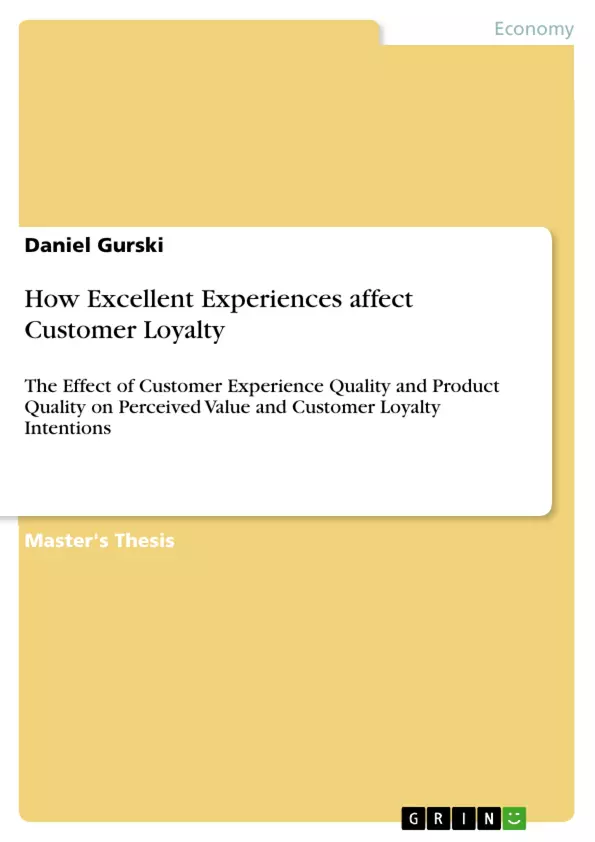Abstract
The thesis at hand develops a new scale to measure customer experience quality on the basis of four dimensions: service quality, atmosphere quality, flow quality, and learning quality. The American coffee company Starbucks is used as exemplary case to validate the theory empirically. Product quality is found to be a separate, but related construct to customer experience quality. The author investigates the effect of customer experiences on customer loyalty and finds that customer experience quality indirectly affects customer loyalty intentions through perceived value. The relative importance of customer experience quality for perceived value and in succession customer loyalty intentions is found to be much higher than that of product quality. Moreover, perceived wealth of the customer acts as a moderator and increases the positive effect of customer experience quality on perceived value wheras it weakens the effect of product quality on perceived value. Collectively, the results extend and clarify concepts in the evolving, but inconsistent customer experience literature. The findings enable managers to stage customer experiences more effectively and more efficiently.
Inhaltsverzeichnis (Table of Contents)
- 1. Introduction
- 2. Literature Review
- 2.1 The Evolution from Products to Services to Experiences
- 2.2 The Initial Conceptual Model
- 2.2.1 Customer Experience Quality
- 2.2.2 Perceived Value
- 2.2.3 Customer Loyalty
- 2.2.4 Perceived Wealth
- 3. Methodology & Research Design
- 3.1 Assigning Scales to the Individual Constructs
- 3.2 Pre-Testing the Scales
- 3.2.1 Data Collection
- 3.2.2 Scale Purification Process
- 3.2.2.1 CXQ scale
- 3.2.2.2 Perceived Wealth scale
- 3.2.2.3 Perceived Value scale
- 3.2.2.4 Customer Loyalty scale
- 3.3 Adjustments and Refinements
- 3.4 Testing the Measurement Model
- 3.4.1 Data Collection
- 3.4.2 Measurement Model
- 3.4.3 Assessing Model Fit of the Measurement Model
- 3.4.4 Assessing Validity of the Measurement Model
- 4. Data Analysis
- 4.1 Comparison of Competing Models
- 4.1.1 Interpretation of Structural Model #1 suggesting Full Mediation
- 4.1.2 Interpretation of Structural Model #2 suggesting Partial Mediation
- 4.1.3 Interpretation of Structural Model #3 suggesting No Mediation
- 4.2 Selection of the Best Fitting Model
- 4.1 Comparison of Competing Models
- 5. Discussion
- 6. Conclusion
- 6.1 Theoretical Implications
- 6.2 Managerial Implications
- 6.3 Limitations & Future Research
Zielsetzung und Themenschwerpunkte (Objectives and Key Themes)
This master's thesis examines the impact of customer experience quality and product quality on perceived value and customer loyalty intentions. The research aims to understand the relationship between these factors and to identify potential mediating effects.- Customer experience quality and its influence on perceived value
- The role of product quality in shaping customer loyalty
- The mediating effect of perceived value on the relationship between customer experience quality and customer loyalty
- The development of a theoretical model and empirical testing of its validity
- Practical implications for businesses seeking to improve customer experiences and foster loyalty
Zusammenfassung der Kapitel (Chapter Summaries)
- Chapter 1: Introduction provides a brief overview of the research topic and its relevance, outlining the objectives and key research questions.
- Chapter 2: Literature Review explores the existing literature on customer experience quality, perceived value, customer loyalty, and the relationship between these concepts. It also introduces the initial conceptual model that forms the foundation for the study.
- Chapter 3: Methodology & Research Design details the methods and design employed in the research, including data collection techniques, scale development and purification, and model testing procedures.
- Chapter 4: Data Analysis presents the results of the data analysis, including the comparison of competing structural models and the selection of the best-fitting model.
- Chapter 5: Discussion interprets the findings of the study, exploring the implications of the results and their relevance to the existing literature.
Schlüsselwörter (Keywords)
This research focuses on the relationship between customer experience quality, product quality, perceived value, and customer loyalty intentions. Key concepts include customer experience, value perception, loyalty formation, and structural equation modeling. The study employs empirical data analysis and theoretical modeling to investigate the proposed relationships.Frequently Asked Questions
How does customer experience quality affect customer loyalty?
The study finds that customer experience quality indirectly affects loyalty through perceived value, having a higher impact than product quality alone.
What are the four dimensions of customer experience quality?
The dimensions identified are service quality, atmosphere quality, flow quality, and learning quality.
What role does 'perceived wealth' play in this study?
Perceived wealth acts as a moderator, increasing the positive effect of experience quality on perceived value while weakening the effect of product quality.
Why was Starbucks chosen as a case study?
Starbucks serves as an exemplary case to empirically validate the theory, as it focuses heavily on the 'experience' rather than just the product.
Is product quality separate from customer experience quality?
Yes, the author treats product quality as a separate but related construct that contributes to the overall perceived value.
- Citation du texte
- Daniel Gurski (Auteur), 2013, How Excellent Experiences affect Customer Loyalty, Munich, GRIN Verlag, https://www.grin.com/document/213447



